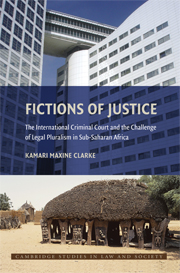 Fictions of Justice
Fictions of Justice Published online by Cambridge University Press: 23 January 2010
This book has explored the challenges of liberalism's cultural life that have come into play through new rule of law regimes and religious practices, the contemporary mobilizations of which extend beyond the borders of the nation state. It also considers how best to address concerns over international jurisdiction alongside the emergence of new forms of criminal responsibility and different notions of crime and justice in more circumscribed contexts. This has involved making sense of the ways that key liberal tenets are taking shape through the cultivation of the liberal subject (see, e.g., Rose, 2003; Coleman, 2006) and how they are alternatively mapped in different epistemological trajectories. As I demonstrated, this making of the individual subject is expressed within the cultural logics of various institutional mechanisms that establish private property, the rule of law, and individual liberty and freedoms as key features for defining justice (Rose 2003; Coleman 2006). A wide range of conceptions of justice exist alongside a notion of the individual and selfhood through which liberalist views of agency and free will thrive in particular moral and institutional economies and through which the language of the tribunal as triumphant and morally shaped takes shape, while the intelligibility of other trajectories or rationalities is negated. In this regard, understanding the ways that people create cultural meanings of justice – how notions of what constitutes “crime” are influenced by executors of the state; how religious, political, and historical institutions are called on to legitimize definitions of crime; how notions of the appropriateness of “punishment” are both produced and contested; and how international norms encroach upon local practices – must involve broadening our understanding of the human rights–rule of law movement in relation to the complex play of power on various scales.
To save this book to your Kindle, first ensure [email protected] is added to your Approved Personal Document E-mail List under your Personal Document Settings on the Manage Your Content and Devices page of your Amazon account. Then enter the ‘name’ part of your Kindle email address below. Find out more about saving to your Kindle.
Note you can select to save to either the @free.kindle.com or @kindle.com variations. ‘@free.kindle.com’ emails are free but can only be saved to your device when it is connected to wi-fi. ‘@kindle.com’ emails can be delivered even when you are not connected to wi-fi, but note that service fees apply.
Find out more about the Kindle Personal Document Service.
To save content items to your account, please confirm that you agree to abide by our usage policies. If this is the first time you use this feature, you will be asked to authorise Cambridge Core to connect with your account. Find out more about saving content to Dropbox.
To save content items to your account, please confirm that you agree to abide by our usage policies. If this is the first time you use this feature, you will be asked to authorise Cambridge Core to connect with your account. Find out more about saving content to Google Drive.